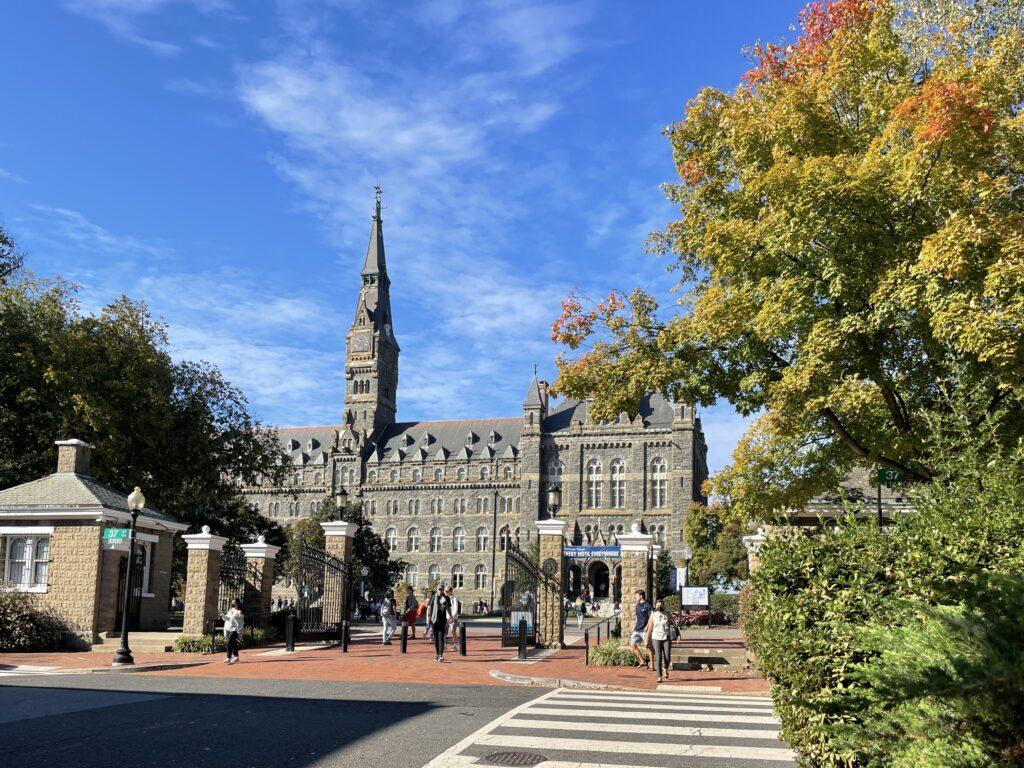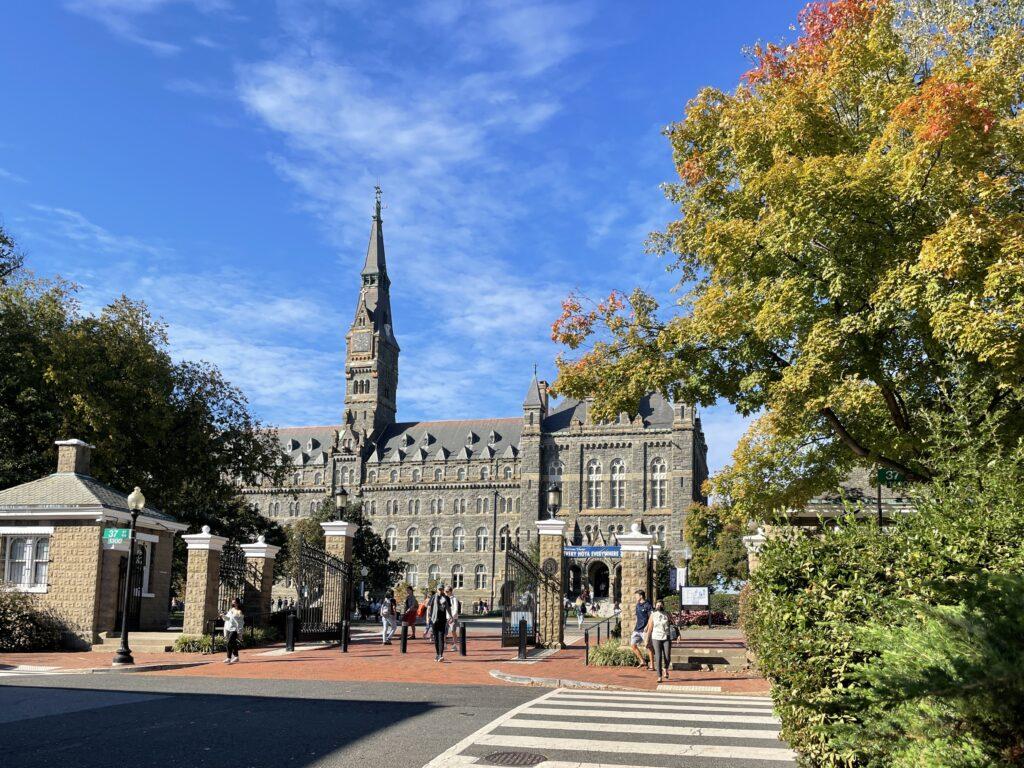Georgetown University Student Association (GUSA) vice presidential candidates discussed plans to better represent the Georgetown community at this year’s GUSA vice presidential debate.
At the Feb. 7 debate, candidates Nirvana Khan (SFS ’24) and Zeke Ume-Ukeje (COL ’24) answered questions about GUSA’s relationship with the campus community, student outreach and their policy platform priorities. Campaigns also discussed whether previous GUSA experience was valuable for much of the debate. The Zoom event was moderated by the GUSA Election Commission and included questions asked by both the audience and members of the commission.

Zeke Ume-Ukeje, who is running with presidential candidate Kole Wolfe (SFS ’24), has no prior GUSA experience and is currently a member of the men’s club soccer team and the African Society of Georgetown.
[Full disclosure: Wolfe previously served as a Hoya Staffer]
Khan, who is running with presidential candidate Thomas Leonard (COL ’23), currently serves as the GUSA Senate’s policy and advocacy chair, the multicultural chair for the South Asian Society, and secretary for the Philodemic Society. Khan previously served as GUSA’s senate outreach chair and as a member of the Finance and Appropriation Committee.
Not having previous experience with GUSA gives the Wolfe-Ume ticket a valuable outsider perspective, according to Ume-Ukeje.
“I don’t come from the GUSA pipeline, but that doesn’t mean that we still can’t be effective and really trying to institute serious change,” Ume-Ukeje said at the debate. “I’m not part of GUSA right now. I consider myself a normal student who has no experience in GUSA, but is interested in meeting students’ needs.”
In the past, GUSA has been criticized for being hierarchical and senators have resigned citing that the GUSA senate is toxic and unsupportive. Last fall, these criticisms led to efforts within the organization to restructure how GUSA operates, including a proposal to abolish the senate. However, these efforts ultimately failed when too few students voted in the November election.
If elected, the Wolfe-Ume ticket would use their existing network to motivate more students to become involved in GUSA, according to Ume-Ukeje.
“We believe that based on our social network, our professional network, our relationships with faculty and staff, we can certainly get a larger majority, a larger group of students to get involved in GUSA,” Ume-Ukeje said.
Khan responded that involvement in GUSA does not mean she cannot reach the broader student population to address their needs.
“I definitely do work in GUSA but I feel I’m really connected to people outside of GUSA and most of the communities I’m a part of aren’t a part of GUSA and have the same concerns,” Khan said during the debate.
If elected, the Leonard-Khan campaign will build on the work done by the preceding administration with president Nile Blass (COL ’22) and former vice president Nicole Sanchez (SFS ’22), who resigned last fall, according to Khan.
Khan said if elected her administration will build on the work she has already done within GUSA.
“Advocacy, advocacy, advocacy. That’s the most important thing I’ve done, I think in my senate career with the Georgetown Coalition for Workers Rights, we did letter writing campaigns, we reached out to campus media for GU272. Putting pressure on the administration happens inside and outside meetings,” Khan said. “And I don’t think anybody has more experience or knowledge of that or ability to do so than Thomas and I.”
Following the mistreatment of workers by the university during the COVID-19 pandemic, students and staff created the Georgetown Coalition for Workers’ Rights, which advocates for better working conditions and increased safety.
In 2019, GUSA passed a referendum in support of a reconciliation fund, which would be allocated to descendants of the GU272, the 314 enslaved people sold by the Maryland Province of the Society of Jesus in 1838 to financially sustain Georgetown. In November 2021, following inaction from the university, GUSA held an event titled “Georgetown F*cking Lied” to demand the enactment of the referendum.
The Leonard-Khan ticket is also campaigning for student needs including working with the student health center to provide STI testing, creating a new cultural climate survey that centers the impact of the COVID-19 pandemic on student mental health, advocating for more sustainable practices on campus, and pushing for the implementation of Latinx, Asian American, South Asian, and environmental studies.
While he acknowledged the work done by the current administration, Ume-Ukeje said GUSA is out of touch with students.
“We think that there’s been some inefficiency in GUSA, so far. We think that we represent a new demographic of students and voters at the school,” Ume-Ukeje said.
The Wolfe-Ume ticket is dedicated to uplifting the voices of all students and bringing awareness to the GU272, according to Ume-Ukeje.
“People have criticized us for our seriousness or qualifications and whether we deserve to be candidates on this ticket,” Ume-Ukeje said. “We’re dedicated to reaching out to groups of people who haven’t been involved in just stuff. We’re dedicated to bringing more awareness to GU272, working and making new and efficient direct impact initiatives, and continuing on the great work that has already been done, but also acknowledging that there’s still more to be done.”
Wolfe and Ume-Ukeje have centered their campaign on making campus clubs easier to join; collaborating with Georgetown Center for Social Justice to create low barrier to entry clubs targeted towards direct action; allocating funding for SNAPS, a student neighborhood patrol organization, and toward grants for low income students; and pressuring the university to act on the GU272 referendum.
Despite believing her opponents are not serious, Khan said both campaigns hope to change the relationship between GUSA and the student body.
“Being willfully ignorant, not attempting to get involved, not reaching to those marginalized communities at all. I would say that’s the biggest weakness I see in my opponents’ campaigns,” Khan said. “I think a strength is realizing that GUSA doesn’t reach out to the student body enough and that it needs to change.”
In her closing remarks, Khan urged all students to participate in the GUSA executive election.
“I know a lot of people don’t think this, but GUSA is incredibly important because it has a huge impact on the lives of marginalized populations at Georgetown,” Khan said. “I know this because I’m low income and without student advocacy, I wouldn’t be able to attend this school. So even if you think GUSA doesn’t matter, this election is so important.”















